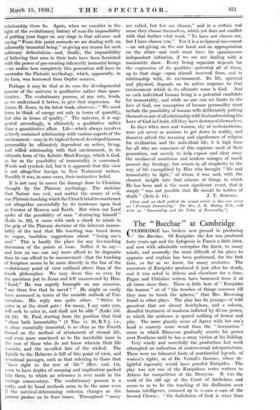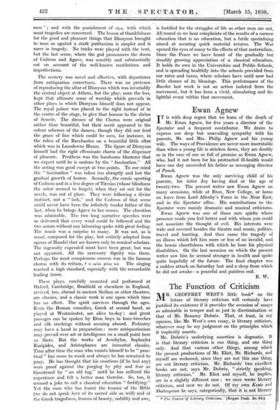The " Bacchae" at Cambridge C AMBRIDGE has broken new g round
in producing the Bacchae. Of Euripides the Ian was produced forty years ago and the Iphigenia in Tauris a little later, and now with admirable enterprise the finest, to many minds, and assuredly the most difficult of his plays to appraise and explain has been performed, for the first time, so far as we know, for many centuries. The executors of Euripides produced it just after his death, and it was acted in Athens and elsewhere for a time. Pagan and Christian writers have borrowed from it at all times since then. There is little here of " Euripides the human " or of " the touches of things common till they rose to touch the spheres," that Mrs. Browning found in other plays. The play has its passages of wild grandeur that are almost Aeschylean, and a solemn, dreadful treatment of madness inflicted by divine power, in which the audience is spared nothing of horror and pity. The more ghastly scene of Agave with her son's head is scarcely more weird than the " fascination " scene in which Dionysus gradually asserts his power over Pentheus until he has a crazy victim at his bidding. Very wisely and mercifully the production last week attempted no indication of controversial interpretations. There were no laboured hints of matriarchallegends, of women's rights, or of Dr. Verrall's theories, whose de- lightful ingenuity would have puzzled Euripides. The play was not one of the Euripidean series written in Athens for competition at the Dionysia. It was the work of his old age at the Court of Archelaus, and seems to us to be the teaching of his disillusion over human intelligence, summed up in ra 0.044,o0 croft, of the Second Chorus ; " the foolishness of_ God is wiser than men " ; and with the punishment of csp,s, with which most tragedies are concerned. - The lesson of thankfulness for the good and pleasant things that Dionysus brought to man as against a stark puritanism is simpler and is rarer in tragedy. No tricks were played with the text, but the last scene, where the god pronounces the doom of Cadmus and Agave, was sensibly and substantially cut on account ' of the well-known mutilations and imperfections.
The scenery was novel and effective, with departures from antiquarian correctness. There was no pretence of reproducing the altar of Dionysus which was invariably the central object at Athens, but the play, none the less, kept that ultimate sense of worship which prevails in other plays in which Dionysus himself does not appear. The royal palace, was placed to the right instead of in the centre of the stage, to give that honour to the shrine of Semele. The dresses of the Chorus were original rather than beautiful, but their merit appeared in the colour schemes of the dances, though they did not lend the grace of line which could be seen, for instance, in the robes of the Bacchantes on a beautiful little altar which was in Lansdowne House. The figure of Dionysus himself had the right effeminate charm of the dispenser of pleasure. Pentheus was the handsome blusterer that we expect until he is undone by the " fascination." All the acting was good except at two points. To our mind the " fascination " was taken too abruptly and lost the gradual growth of horror. Secondly, the comic sporting of Cadmus and in a less degree of Tiresias (whose blindness the actor seemed to forget), when they set out for the revels, was out of place. They were following a divine instinct, not a " lark," and the Cadmus of that scene could never have been the infinitely tender father of the last, when he brings Agave to her senses. The elocution was admirable. The two long narrative speeches were so delivered that every word could be followed and the two actors without any labouring spoke with great feeling. The music was a surprise to many. It was not, as is usual, composed for the play, but entirely adapted from operas of Handel that are known only to musical scholars. The ingenuity expended must have been great, but was not apparent. All the necessary dignity was there. Perhaps the most conspicuous success was in the famous chorus with its refrain, .6, n scabv 951Nov ad. The singing reached a high standard, especially with the remarkable leading tenor.
These plays, carefully mounted and performed at Oxford, Cambridge, Bradfield or elsewhere in England, revived, too, abroad in ancient Sicilian or other theatres, are classics, and a classic work is one upon which time has no effect. The spirit survives through the ages. Even the Roman comedies, Greek at second hand, as played at Westminster, are alive to-day and great passages can be spoken by Eton boys in knee-breeches and silk stockings without seeming absurd. Pedantry may have a hand in preparation : mere antiquarianism may prevail over art or intelligence on a small point here or there. But the works of Aeschylus, Sophocles Euripides, and Aristophanes are immortal classics. Time after time the man who vaunts himself to be " prac- tical " has- come to mock and always he has remained to pray. He has thought that his emotions (if he had any) were proof against the purging by pity and fear as threatened by " an old tag," until he has suffered the experience and felt a better man therefor. So, too, it seemed a joke to call a classical education " fortifying." Yet the man who has learnt the lessons of the Bible (we do not speak here of its sacred side as well) and of the Greek tragedians, lessons of beauty, nobility and awe, is fortified for the struggles of life as other men are not. All round us we hear complaints of the results of a narrow education that is no' education, but a futile specializing aimed at securing quick material returns; The War opened the eyes of many to the effects of that materialism. Since the Peace we have heard of the gradually but steadily growing appreciation of a classical education. It holds its own in the Universities and Public Schools, and is spreading healthily into the schools provided from our rates and taxes, where scholars have until now had little chance of its blessings. This performance of the Baechec last week is not an action isolated from the movement, but it has been a vivid, stimulating and de- lightful event within that movement.





















































 Previous page
Previous page